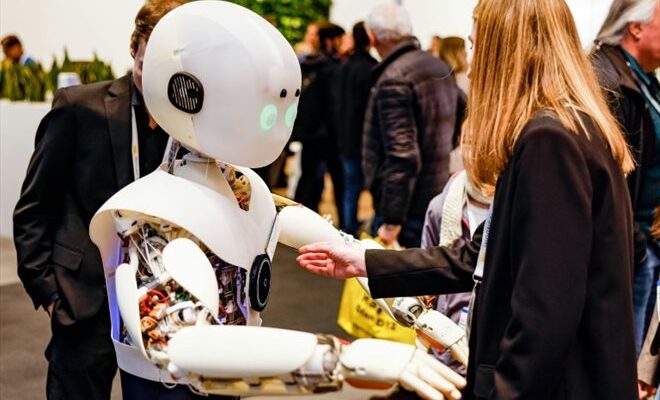Philip Singer, Business Architect for Data and AI at Hewlett-Packard Enterprises (HPE), operates a robot (developed in cooperation between HPE and German AI startup Aleph Alpha) that can speak and respond to questions, during the technology fair in Hanover, Germany, on April 17, 2023 (AFP / Axel Heimken)
A robot to help fix… other robots. The artificial intelligence (AI) revolution is also eagerly awaited by manufacturers, who are banking on this technology to make their factories more efficient.
At the Hannover Fair in Germany, an international meeting place for industrial technologies that took place this week, the enthusiasm for the potential of generative AI was in all the conversations, on all the stands.
His tablet in hand, a young employee of the American IT services provider HPE dialogues with a virtual assistant equipped with a generative AI – which learns from existing data to generate new content. Objective: to operate the articulated arm of a robot.
To solve a technical problem, “factory workers no longer need to bring a qualified expert on site, artificial intelligence is responsible” for guiding the repair, explains Thomas Meier, data analyst at HPE who came to present the prototype.
The American group with 60,000 employees has been collaborating for a year with the young German start-up Aleph Alpha, whose team has around fifty people, considered one of the main European competitors of ChatGPT, the conversational robot developed by OpenAI.
In this industrial application, it is a question of using language and images to communicate with the employees of a factory.
They can, for example, send a photo of a machine so that the program itself detects errors or validates its installation.
-Made in Europe-

A woman interacts with a robot from Devanthro – The Robody Company, in front of a photo box at the technology fair in Hanover, Germany, April 17, 2023 (AFP/Axel Heimken)
“Unlike ChatGPT, our program can trace the data that led him to make his decision,” boasts Mr. Meier, dressed in a traditional Bavarian jacket.
Even if Aleph Alpha has managed to raise 28 million euros so far, the German nugget is far from the billions of euros brewed by Open AI, financed by the American Microsoft.
The Heidelberg start-up highlights an asset that could make the difference: keeping customer data in Europe.
The Italian Personal Data Protection Authority, in fact, blocked the use of the ChatGPT robot at the end of March, accusing it in particular of not respecting European regulations on the collection and mass storage of data.
The CEO of Aleph Alpha, Jonas Andrulis, calls on Europe to “not only put its energy on regulation, but also on creation”. “The European contribution to AI should not be reduced to a barrier of cookies!”, He told AFP in a telephone interview.
On another stand at the fair, the German giant Siemens is also exhibiting an AI application to optimize the operation of factories.
In partnership with Microsoft, the industrial conglomerate promises this year the release of a new version of the Teams application for collective messaging. Equipped with ChatGPT, it will be specifically designed to assist workers and recognize product defects.
– Labor revolution –
Microsoft and Siemens, which say they work with several customers in the automotive and aerospace industry, refute the idea that AI will replace flesh-and-blood technicians and cut jobs.
“We have found that 70% of problems are not identified and therefore not solved”, explains Anthony Hemmelgarn, CEO of Siemens Digital Industries Software.
By solving them, AI “does not replace anyone”, he reassures, promising above all “efficiency gains” for the industry.
Another advantage: AI promises to “alleviate the shortage of skilled workers” from which Germany is particularly suffering, believes Jochen Köckler, director of the Hanover fair.
In the largest European economy, nearly 58% of industrialists complain of a lack of manpower, according to a study by the Federal Institute for Vocational Training (BIBB) published last December.
For Jonas Andrulis, we must not minimize the upheavals that await the world of work. “AI will absolutely change everything for jobs that can be done in front of a computer,” he says.
“It is not artificial intelligence that will take the jobs, but rather the company using AI that will take the market share of the one that does not use it”, assures the entrepreneur.
© 2023 AFP
Did you like this article ? Share it with your friends with the buttons below.




